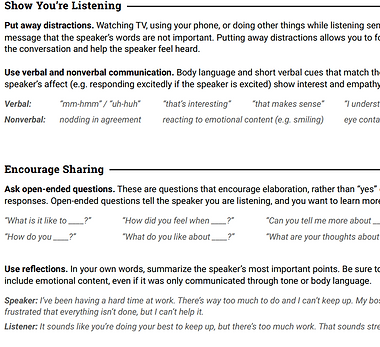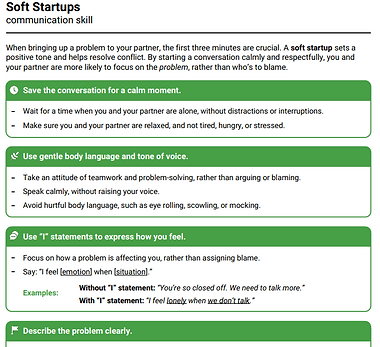

Interpersonal Effectiveness
The development of interpersonal effectiveness skills can greatly benefit individuals with BPD by enabling them to better regulate their emotions. This, in turn, leads to fewer and less intense emotional outbursts, resulting in improved mental health and more stable relationships.
Explore activities and worksheets below to help increase interpersonal effectiveness by clicking on the photos. Activities linked are provided by therapistaid.com.
DEAR MAN, FAST & GIVE Activity
Developing the ability to navigate interpersonal relationships by finding a balance between asserting personal needs and considering the needs of others is crucial for maintaining healthy connections.
Striking a balance between advocating for oneself and being mindful of others can be challenging. To achieve this balance, one must acquire skills in objective effectiveness, relationship effectiveness, and self-respect effectiveness. Objective effectiveness is about getting what you want out of a situation.
The acronym D.E.A.R. M.A.N. will remind you how to clearly express your needs or desires. The tools, G.I.V.E and F.A.S.T are also included in this worksheet. Click the photo to access a link to the worksheet.
Active Listening
Viewing listening as an engaged activity, as opposed to a passive one, involves actively engaging in dialogue rather than merely observing. Active listeners demonstrate their attentiveness, promote open communication, and aim to comprehend the speaker's message.
This worksheet on active listening can promote healthy relationships and improved communication. Click the photo to access a link to the worksheet.
"I" Statements
When someone feels they are being blamed, it is common they respond with defensiveness, which can lead to a shut down in communication and strain in interpersonal relationships.
"I" statements are a simple way of speaking to avoid the trap of projecting blame onto others, while still taking responsibilitity for our own feelings.
This activity can assist in better communicating your needs, or addressing issues in a respectful and assertive manner, while also encouraging advocacy and empowerment to the individual using the "I" statements. Click the photo to access the worksheet.
Soft Start Up
The initial three minutes of discussing an issue with your partner hold great significance. A gentle beginning establishes a positive atmosphere and aids in conflict resolution. By initiating the conversation in a calm and respectful manner, both you and your partner are more inclined to concentrate on the problem at hand rather than assigning blame.
This worksheet on soft start ups in communication can promote better communication with your partner when discussing hard topics. Click the photo to access a link to the worksheet.
Assertive Communication
Assertive communication is a communication style in which a person stands up for their own needs and wants, while also considering the needs and wants of others, without being passive or aggressive.
This worksheet can help you better communicate your needs, concerns, frustrations, etc. while maintaining a respectful and considerate dialogue. Click the photo to access the worksheet.
Reflections Communication Activity
Using a technique called reflection can help an individual become a better listener. When reflecting, you repeat back what someone has just said to you, but in your own words. This shows that you didn't just hear the other person, but you are trying to understand them, and this helps others feel seen and validated in their experiences. Reflection also helps to minimize assumptions of other's feelings or thoughts, and offers room for clarification and enhanced understanding of others.
This activity can improve quality of communication and offer both an empathetic and caring approach in interacting with others. Click the photo to access the worksheet.











